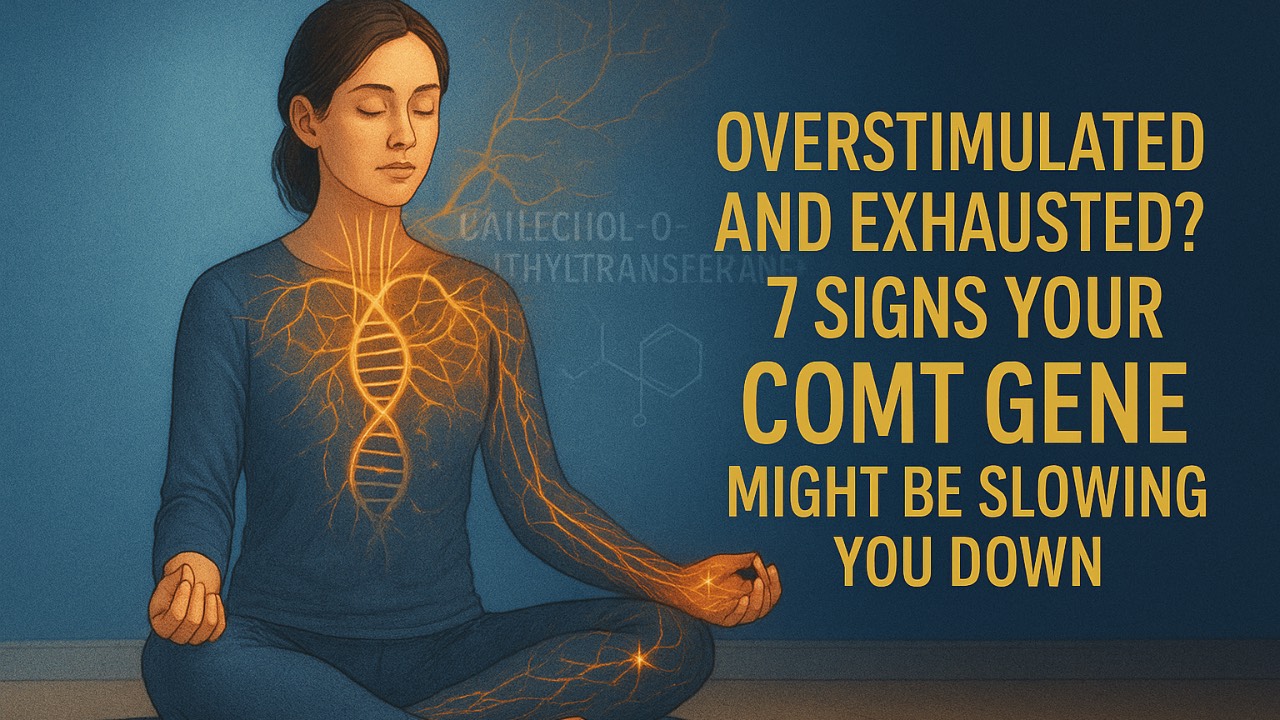Overstimulated and Exhausted? 7 Signs Your COMT Gene Might Be Slowing You Down
Apr 21, 2025
You’re doing everything right. Or at least, you thought you were.
The clean diet. The calming supplements. The meditation apps that promise to rewire your brain in ten minutes or less.
And yet… somehow, you still feel wired. Drained. Oversensitive to things that shouldn’t get under your skin.
If you know that feeling—the one where your body won’t settle even when your mind begs it to—there’s a chance something deeper is at play.
Something no one ever told you to check.
It might be your COMT gene. And honestly? For a lot of people, it changes everything once they see it.
What Is the COMT Gene (and Why You Should Care)
COMT stands for catechol-O-methyltransferase. (I know. It sounds like something out of a chemistry textbook.)
But really, it’s simple:
COMT helps break down your brain’s stimulation signals.
Things like dopamine. Epinephrine. Norepinephrine.
The stuff that drives motivation, stress reactions, energy.
When COMT is working well, it keeps your system balanced. Enough stimulation to stay alert, but not so much that you feel like you’re living inside a fire alarm.
When it’s sluggish, though? Everything piles up. Fast.
Fast vs. Slow COMT Variants: Which One Are You?
Everyone’s got a version of COMT. It’s not rare. It’s just… different, depending on the hand you were dealt.
Some people have a fast COMT. Their bodies clear neurotransmitters quickly. Sometimes maybe too quickly, leading to things like low motivation or feeling a little flat emotionally.
Others—and maybe this sounds familiar—have a slow COMT.
Meaning they don’t clear stimulation as fast. The stress builds.
The excitement lingers. The dopamine from that cup of green tea? Still swirling in your system at midnight.
And over time, slow COMT folks can end up feeling like they’re burning the candle at both ends—even when they’re technically doing “everything right.”
7 Signs Your COMT Gene Might Be Slowing You Down
You don’t need a genetic test to start putting the puzzle pieces together.
Sometimes your body tells you loud and clear… if you’re willing to listen.
Here’s what tends to show up:
- Overstimulation from supplements. Things like B12, green tea extract, or nootropics just make you feel jittery—or worse.
- Inability to wind down at night. Even when you’re falling over tired, your brain keeps playing reruns.
- Irritability in high-stimulation environments. Crowds, loud music, too many bright lights—it all feels too much.
- Emotional sensitivity. Not just “I cry at movies” sensitive. More like “why does this small thing feel like a 10-ton weight?” kind of sensitive.
- Intense drive… followed by quick burnout. You start strong, you crash even harder.
- Trouble with high-protein diets (or herbs like ashwagandha, rhodiola). Things that are supposed to help end up backfiring.
- The “more is worse” effect. More supplements, more caffeine, more anything—it just ramps up the discomfort.
And no, it’s not all in your head.
It’s your nervous system, working overtime with no clock-out button.
Why Trying to “Push Through” Often Backfires
If you’re tired and foggy, the natural instinct is to add more energy.
More coffee. More supplements. More motivational playlists at 6 AM.
Maybe you’ve even told yourself, “If I just try a little harder…”
Here’s the catch: if your COMT is already slow, adding more stimulation is like pouring water into a cup that’s already overflowing.
You’re not fixing the problem—you’re amplifying it.
The result?
- Wired, but nowhere near awake.
- Restless mind. Racing thoughts. Emotional reactivity when you least expect it.
- That awful trapped feeling, stuck in “fight or flight” without an exit ramp.
The fix isn’t more fuel.
It’s learning how to clear the traffic jam inside your brain.
How to Support a Slow COMT Gene (Without Driving Yourself Crazy)
This isn’t about flipping your life upside down.
It’s about small, smart tweaks that respect how your system actually works—not how it’s “supposed” to work.
Here’s what often helps:
|
Strategy |
Why It Matters |
|
Non-methylated B vitamins (like folinic acid, hydroxo B12) |
They nourish without overstimulating your system. |
|
Magnesium glycinate or threonate |
Helps balance neurotransmitters and calms your nerves. |
|
Eating lighter at night |
Less dopamine load = better, deeper sleep. |
|
Avoiding strong stimulants |
Things like green tea extract, tyrosine, heavy nootropics can be too much. |
|
Phosphatidylserine supplementation |
Smooths out cortisol spikes so you can actually relax. |
|
Gentle, low-stimulation evening routines |
Gives your nervous system a chance to downshift naturally. |
Not everything will be perfect right away.
It might take some trial and error. It might feel a little frustrating at first.
But when it clicks—when you find that lighter, calmer feeling again—you’ll realize it wasn’t you.
It was never about willpower.
It was about biology.
If This Sounds Familiar, You’re Not Alone
You are not the only one who feels like the world is “just a little too much” sometimes.
Slow COMT doesn’t make you broken.
If anything, it often means you’re deeply sensitive, empathetic, perceptive. You pick up on things others miss.
(And sure, sometimes it also means you pick up on stress signals that others shrug off without blinking.)
Understanding your system—your blueprint—lets you move through the world differently.
More compassion for yourself.
More precision with your health choices.
More peace.
Want to Go Deeper? Our Course on COMT and Methylation Might Help
If you’re ready to stop guessing (and stop feeling like you’re failing some invisible health test), you might love the deep dive we created.
Inside the course, I walk through:
- How COMT, MTHFR, and other genes influence your mood, focus, and stress
- The supplements that work with your system (and the ones that don’t)
- Step-by-step guides to calming an overstimulated nervous system
Not another generic “eat clean and exercise” program.
Actual strategies tailored to your biochemistry.
[Explore the Full Course Here → COMING SOON! Stay Tuned.]
FAQs
What does the COMT gene actually do?
It breaks down neurotransmitters like dopamine and norepinephrine, balancing stimulation and stress inside your body.
How can I tell if my COMT is slow?
If you notice sensitivity to stimulants, trouble winding down, emotional overreactions—you might be seeing the signs already. (Genetic testing can confirm.)
Are methylated vitamins bad if I have slow COMT?
Not bad… but sometimes overwhelming. Non-methylated forms are often gentler on your system.
Can what I eat impact my COMT function?
Absolutely. High-protein and stimulant-heavy diets can pile more dopamine into your system, making things worse if you already clear it slowly.
Is having slow COMT dangerous?
Not at all. You just have to support it the right way—and honestly, a lot of people with slow COMT end up with beautiful strengths when they’re balanced.
Can I speed up my COMT?
You can’t rewrite your genes, but you can absolutely support your system so you feel clearer, calmer, and more resilient day-to-day.
Final Thought?
You’re not doing life wrong.
You’re just wired naturally and exactly the way you should be. Embrace it and keep learning to go with your body, rather than against it.
(And that’s a good thing—once you know how to work with it.)


